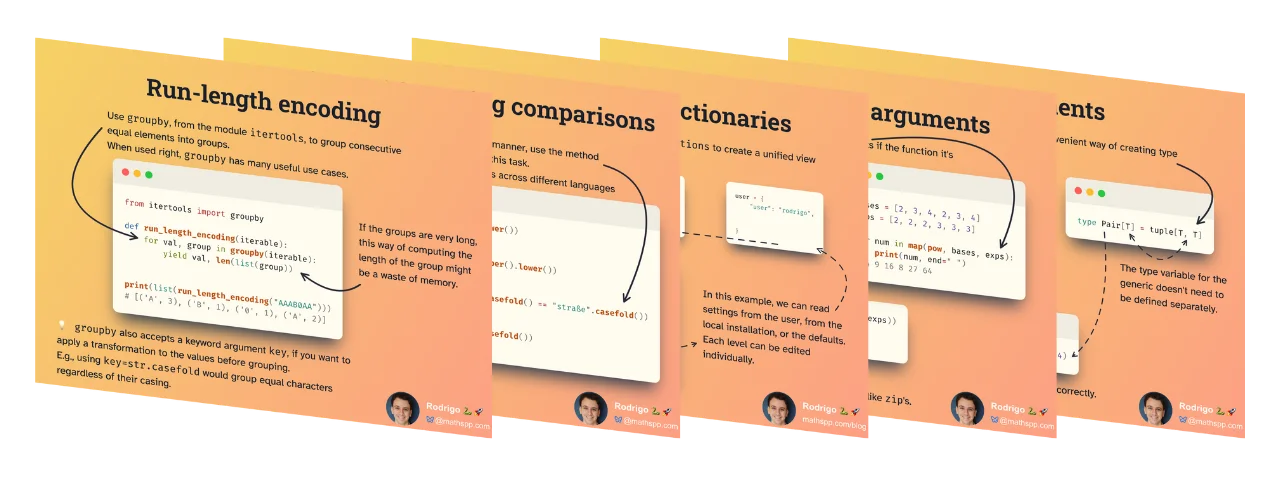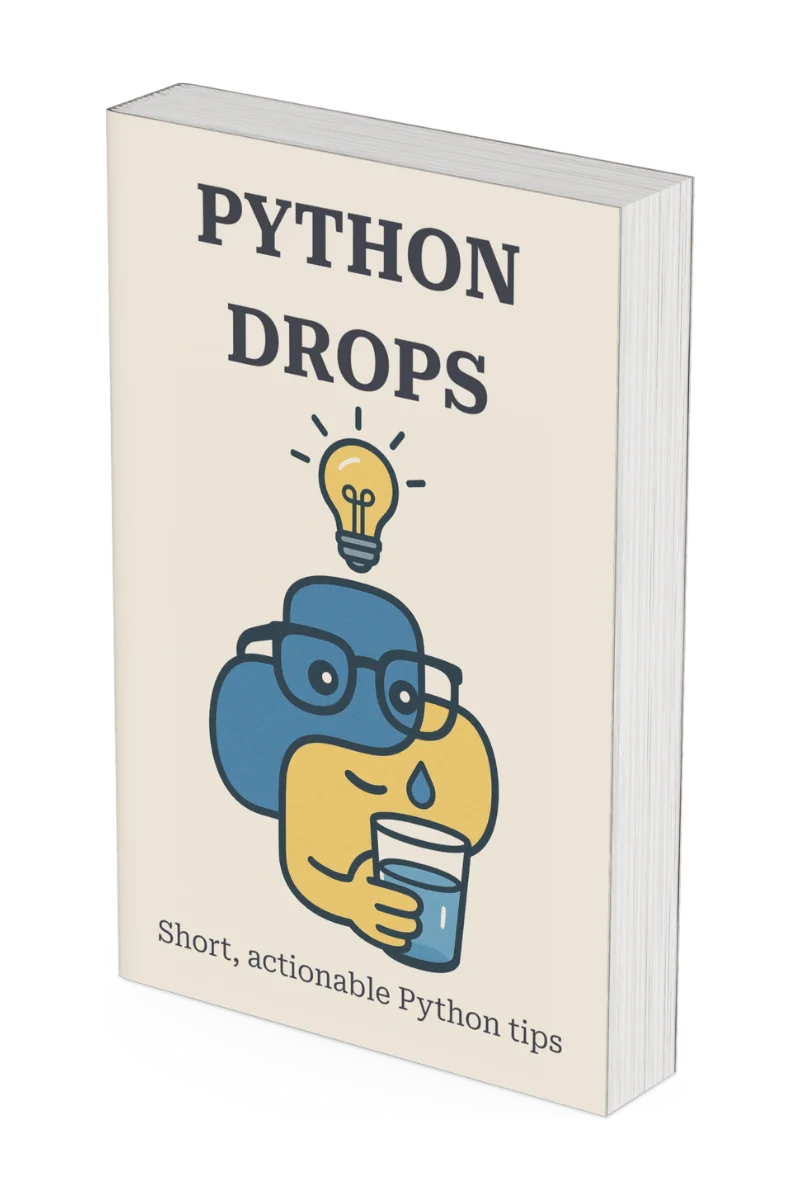Become smarter about Python
Get a short, actionable Python tip each day. Tips are short (under 100 words), actionable (you can apply them right away) and they're also sent as a flashcard, ideal if you're a visual learner.
Become smarter about Python ππ§
What readers have to say
I discovered Rodrigoβs Python drops as I was exploring new features of Python 3.14.0 when it was in beta testing.
I was trying to understand the new Placeholder class and found his drop about not only that topic but how it applies to partial.
His explanation was clear, concise and left me understanding a wonderful new Python feature. Iβm a highly satisfied Python drops reader.
The "Python Drops" format of one easily digestable topic at a time with code snippets is quite good.
Rodrigo is a consistent source of generous, highβquality technical insights about the [Python] language we know and love.
I very much enjoy receiving Rodrigo's Python tips on my email. They're bite-sized and informative, just great as a daily dopamine hit!
The diagrams are always so well done they don't even need supporting text.
I always recommend Rodrigo's posts to friends and colleagues.
Newcomers will learn Python concepts in an engaging way, and experienced programmers can refresh their knowledge and even learn something new about latest Python releases.
Thanks Rodrigo!
This is a great daily read regardless of your Python level. Within a minute or two; you are introduced to a language component or mechanism, a common use case for it, and example code demonstrating it.
Quality and fun. Highly recommended!
Rodrigo, your "tip cards" have been smashing, elegant and informative! Thank you for sharing them!
I really enjoy your Python drops! So much new exposure to what's possible with the language!
Past tips
- Moving average
- Using a list as a stack
- Title case
- Creating temporary files
assertstatements with custom message- Oxford comma
- Truthy and Falsy
- Private members
strftimevsstrptime- Controlled string splitting
- Chaining comparison operators
- Remote interactive debugging
- Check for
Nonefunctionally - min-heaps and max-heaps
- Parse dates from strings
- Error handling with multiple types
- Grouping digits in the fractional part
asynciointrospection- Custom t-string processing
jsonCLI- Compression algorithms
- Forward references in annotations
- Find similar words
- copy files
- Colour in the REPL
NotImplementedError- Set operations with operators
- String formatting field alignment
- Cycling over an iterable
NotImplemented- Safe random tokens
- Decimals
- Using fractions
- Regex matches across newlines
- Compute partial sums with
accumulate - Reduce boilerplate with dataclasses
- Alternative constructors as class methods
- Read-only attributes
- Strict batching
- Class and instance attributes
- Invertible flags
- Find files in a directory
- Efficiently count characters in a string
- Efficiently count words in a string
- Make numbers more readable
- Prevent subclassing/overriding
pairwisegeneralisation- Remove punctuation functionally
- Integer literals in multiple bases
- Enforce positional arguments
- Operate on two lists of numbers
- Using properties
- Ignore exceptions
- Paginate results
- All equal
- Efficiently extending a list
- Safely overriding methods
- Dictionary creation idiom
- Send data into generators
- Double leading underscore
dict.fromkeys- Constant variables
- Two-dimensional range
- Type hints that refer to functions
- Non-greedy regex quantifiers
- Add typing to decorators
- Dynamic module attribute look-up
map's keyword argumentstrict- Custom
enumsearch behaviour - Dunder method
__missing__ - AST parsing
- Typing
*argsand**kwargs - methods
__str__and__repr__ - Pretty-printing nested data structures
- Filtering Truthy values
- Readable object names
- Custom containment checks
- Match word boundaries
- Common
__hash__implementation - Docstring
__doc__attribute - Dynamic width string formatting
- Non-local variables
- Temporary directories
- Timestamp file names
- Preserving decorated function metadata
- Natural alphabetical sorting
- Constrained generics
- Caching sets and frozen sets
- File modes
- Add lists together, fast
- Generics syntax
- Extracting text data into a dict
- Verbose regular expressions
- Structural validation and homogenisation
- Bulk renaming files
- Typing overloads
- Undoable iterator with value history
- Match an exact dictionary structure
- Built-in
nextwith a default value - Match the structure of custom objects
- Peek at an iterable
- Slicing generators for debugging
- Structural pattern matching with dictionaries
- File discovery by name pattern
- Extract assignments from conditionals
- Regex multiline flag
- Split strings in two halves
- Generator recipe
- Concatenate files from handlers
- Formatting dates with f-strings
- Resolving paths
- Named groups in regex
- Formatting big numbers
- One-shot file I/O
- File tail
- Idiomatic sequence slicing
- Subclassing immutable types
- Underscore in the REPL
- Ergonomic multiline strings
- Structural unpacking
- t-strings need processing
- Module
itertoolscategorisation - Case-insensitive regular expressions
- String constants
- Dynamic regex replacements
- Random choices
- Redacting email addresses
- Batching API calls
- Dot product idiom
- Counting values that satisfy a predicate
- Format specifier
!r - Read files in chunks
- Bounded cache
- Longest and shortest
- OS-agnostic line splitting
- Automatic enumeration values
- Global enumeration members
- Multi-dictionary
- Typing iterables instead of lists
- Inline lists and tuples
- Transpose a list of lists
- Normalise strings by removing accents
- Most recently-modified file
- Enumerations of string values
- Return value of a generator
- Use
Literalfor options - Flag enumerations
- Enforce keyword arguments for options
- Notify parent class when subclassing
- Dynamic attribute manipulation
- Longest word in a string
- Chain multiple dictionaries
- Set operations with
dict.keys() - Current date and time
- Dunder attribute
__file__ - Self-debugging f-strings
- Immutable dictionary
- Create context managers with
contextlib.contextmanager - Type statements
- Round to pretty whole numbers
- Multiple options in a single
casestatement - String prefixes and suffixes
- Run-length encoding
- Count characters in a file
- Remove punctuation from a string
mapwith multiple arguments- Schedule cleanup actions
- Unique elements from a list
- Last element that satisfies a condition
- First element that satisfies a condition
- Parsing integers from different bases
- Type unions with the vertical bar in
isinstance - Case-insensitive string comparisons
zip's keyword argumentstrict
Refer readers, access the tip backlog
The mathspp drops ππ§ newsletter is free. That's 5 tips per week, for free.
If you refer your friends and colleagues to the mathspp drops ππ§ newsletter, you can earn rewards. For example, you can earn access to the backlog of tips (started on the 4th of March of 2025), which is available as an e-book and as a set of flashcards.
To refer friends, check the instructions on the bottom of every tip email you receive.












